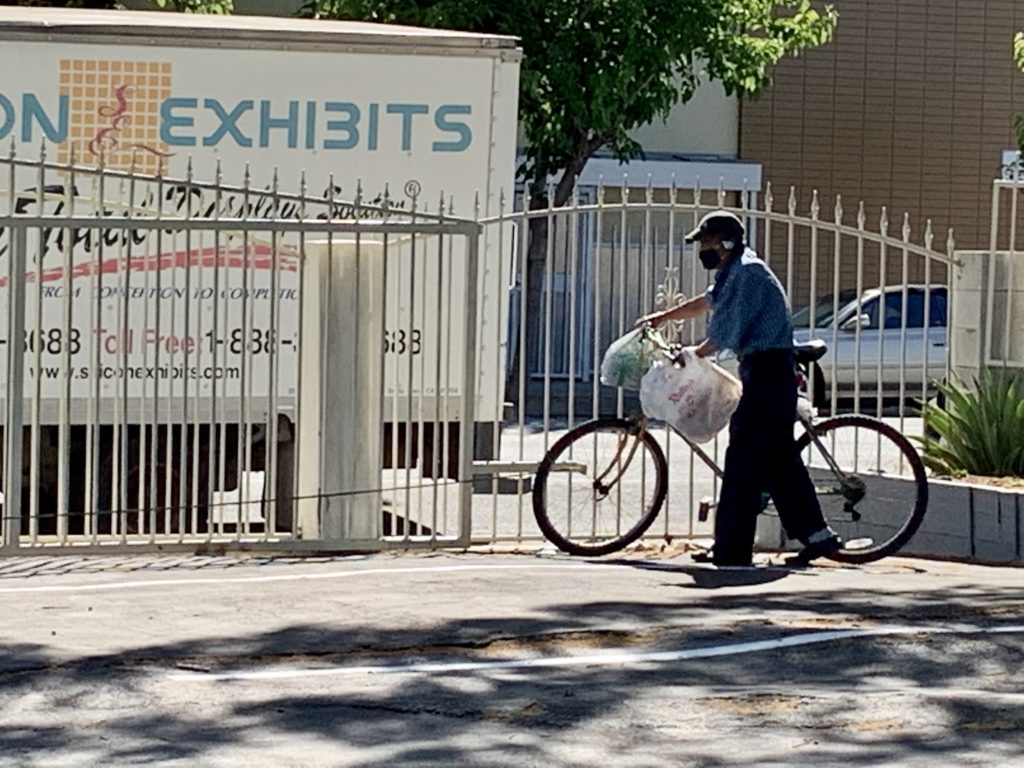As California recovers from the pandemic job loss, the demand for food pantries in San Jose remains at a record high with no signs of declining.
“We are not seeing a significant decrease (in the need for food pantries),” said Cat Cvengros, spokesperson for local food bank Second Harvest of Silicon Valley. “The biggest reason is that you can’t just flip the switch. If somebody gets a job today that doesn’t mean their debt of (the) last year and a half is gone.”
According to the Employment Development Department, California added 100,000 new jobs in April, accounting for 38% of the national job gain that month. By May, California recovered almost half the jobs lost due to the pandemic.
But not everyone is benefiting from this job recovery.
Cvengros said Second Harvest served 250,000 people pre-pandemic. But since last year, the food bank has doubled its number of beneficiaries. According to a recent survey of food pantry clients conducted by Second Harvest, 57% of respondents reported having less than $100 in savings. More than 70% of respondents indicated that someone in their household lost a job or had work hours reduced due to the pandemic.
A recent report by the California Association of Food Banks says that statewide food insecurity increased 2.5 times in 2020 compared to pre-pandemic levels, affecting 10 million Californians.
As of December, a quarter of all California residents live with food insecurity. Communities of color are hit harder: 31% of Black residents and 32% of Latino residents struggle with putting food on the table.
Manuel Segura hasn’t found a job since being laid off from his janitor position last year following the state shutdown. Every other day, the 71-year-old Sunnyvale resident rides his bike 12 miles to the food pantry at the Vietnamese Seventh-Day Adventist Church in San Jose. The immigrant from Mexico said he doesn’t qualify for state or federal aid, so the pantry is his main social support. Although there are other food pantries closer to his home, he said he enjoys biking to San Jose to stay in shape.

Segura picks up non-perishable groceries and fresh meals for his household of three, which includes his 31-year-old unemployed son and a family friend.
“The food is great, I have no complaints,” Segura said in Spanish, looking at his three white bags with beef chili, beans, milk and Panera pastries, among other products. “This is what we’ve been eating ever since the pandemic started. This is the fuel that keeps this young horse going.”
Cornelio Chavez, the food pantry supervisor, said the pantry receives about 70 people during the one hour it operates daily, dozens more than they catered to pre-pandemic.
“It’s sad to see this reality,” he said in Spanish, noting down the first names of clients and their number of bags. “You think that when you move up north life will be different, but no.”
At San Jose State University, the Spartan Food Pantry remains busy serving students even after the end of the Spring semester.
Chinmay Kamerkar, a 22-year-old Master’s student from Mumbai, and his three roommates have gotten groceries from the pantry for four months. As an international student who moved from India to San Jose this year, he doesn’t qualify for state or federal benefits.
“I came (to the U.S.) right after my undergrad, I haven’t worked and I haven’t saved much so the pantry saves me around $100 in food monthly,“ Kamerkar said while in line to pick up his food.
The school food pantry is one of more than 300 partner facilities working with Second Harvest. Cvengros said the distribution system to get supplies from the food bank to affiliate pantries suffered a loss of volunteers due to the pandemic. The National Guard and California Conservation Corps took over empty volunteer roles with support from the state government and San Jose Mayor Sam Liccardo.
“We would not have been able to double our food distribution without their help,” Cvengros said.
She’s unsure when the state support will stop and is actively encouraging residents to sign up as volunteers with Second Harvest’s food distribution team. She said she sees the demand for food pantries remaining high in the coming months.
“If you’ve exhausted all of your savings, you’ve deferred maintenance on your car and you’ve moved into a one-bedroom with your family members, it’s not like you can just get that car fixed and you get everything set up,” Cvengros said. “It’s gonna take a long time.”
Contact Alejandra Arevalo at [email protected] and follow her @alejandrareval_on Twitter.


Leave a Reply
You must be logged in to post a comment.